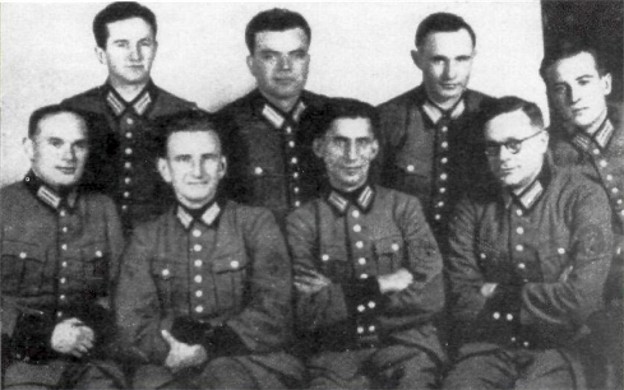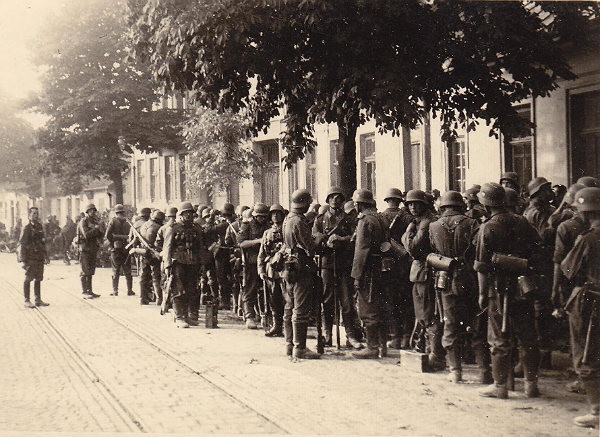Legion of Ukrainian Nationalists
Legion of Ukrainian Nationalists (Легіон українських націоналістів or Дружини українських націоналістів; Legion ukrainskykh natsionalistiv or Druzhyny ukrainskykh natsionalistiv). A Ukrainian military formation in the German army during the Second World War. The term ‘Legion’ was used as a popular name, in an analogy with the Legion of Ukrainian Sich Riflemen, for an Organization of Ukrainian Nationalists-organized military unit which under Col Roman Sushko's command attempted to participate in September 1939 in the German-Polish War. The unit was formed initially in Austria of former soldiers of the Carpathian Sich, who in June 1939 had been released from Hungarian internment. At the end of August 1939 the Legion consisted of two understrength infantry battalions, which arrived on 3 September in the vicinity of Prešov, Slovakia. On 24 September it crossed the former Czech-Polish border and started to advance through the Lemko region, but the Germans quickly intervened and demobilized it. In April 1941 the military department of the OUN (Bandera faction), headed by Dmytro Hrytsai, recruited two battalions with the approval of German military (Wehrmacht) circles. The northern battalion, Spezialgruppe Nachtigall, consisted of three companies, commanded by Lt A. Herzner, that underwent final military training near Neuhammer, in Upper Silesia. The southern battalion, Spezialgruppe Roland, was commanded by Maj Ye. Pobihushchy and was trained near Wiener-Neustadt in Austria.
With the outbreak of the German-Soviet War, Nachtigall marched alongside the German army through Radymno, Lviv, and Ternopil. Placed under the command of Maj Heinz on 13 July 1941 and renamed the Second Battalion of the Brandenburg Regiment No. 800, it was sent into front-line combat in the vicinity of Proskuriv (Khmelnytskyi) and, later, Vinnytsia. During the latter part of August, Nachtigall was taken out of the combat zone and transported to Cracow, where it was disarmed and returned to Neuhammer for internment. Roland marched through Romania and Moldavia and entered Ukraine on 25 July. In August, before it could see any action, it too was disarmed and recalled to Austria.
In mid-October 1941 at Frankfurt an der Oder, both units were integrated into Schutzmannschaftbataillon 201, under a one-year contract. The entire chain of command (22 officers) was Ukrainian: Maj Ye. Pobihushchy was battalion commander, and Roman Shukhevych, M. Brygider, Vasyl Sydor, and V. Pavlyk were company commanders. The battalion's initial strength was over 600. On 19 March 1942, after intensive retraining, it was sent to Belarus to protect communication lines and to combat Soviet partisans . The battalion's commanders protested repeatedly against German policy in Ukraine. In November 1942, when its soldiers refused to renew their contract, they were disarmed in Mahiliou, discharged, and sent home. The officers were brought to Lviv and on 8 January 1943 incarcerated in a Gestapo prison. Several of them, including Shukhevych, escaped and joined the Ukrainian Insurgent Army.
BIBLIOGRAPHY
Druzhyny ukraïns’kykh natsionalistiv u 1941–1942 rokakh (Munich 1953)
Kal’ba, M. (comp). U lavakh Druzhynnykiv (Denver 1982)
Pobihushchyi, Ie. Mozaïka moïkh spomyniv (Munich–London 1982)
Kal’ba, M. (comp). ‘Nakhtigal’ (Kurin’ DUN) u svitli faktiv i dokumentiv (Denver 1984)
Petro Sodol
[This article originally appeared in the Encyclopedia of Ukraine, vol. 3 (1993).]

